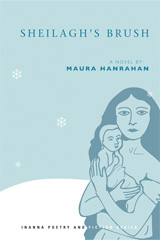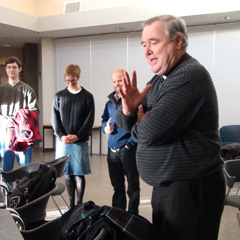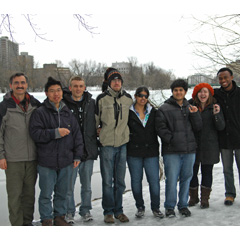Youth Speak News
 TORONTO - The WeStand human rights and social justice program, an initiative started by staff at Marshall McLuhan Catholic Secondary School in Toronto, offers senior students an opportunity to learn about social justice issues and to be agents of change in the world.
TORONTO - The WeStand human rights and social justice program, an initiative started by staff at Marshall McLuhan Catholic Secondary School in Toronto, offers senior students an opportunity to learn about social justice issues and to be agents of change in the world.“The philosophy of our program is to give a sense of history so that students understand what has happened in the past, but also to connect it to situations that are happening today so that they can be students who are part of change,” said Michael Xuereb, the director of WeStand and head of the religion department at Marshall McLuhan.
Currently in its first year, the 36 student members are participating in 15 hours of a series of after-school and weekend sessions, which began in February. In the sessions, the students are introduced to social justice issues from around the world, both from the past and the present.
Moral judgments left up to readers in Sheilagh’s Brush
By Annette Gagliano Life is a challenge and each day there is a possibility that new problems may arise, from tensions in relationships to the hardships of child-rearing and earning money for survival. However, in the end, what really matters is whether the final decisions and outcomes of these struggles are morally acceptable.
Life is a challenge and each day there is a possibility that new problems may arise, from tensions in relationships to the hardships of child-rearing and earning money for survival. However, in the end, what really matters is whether the final decisions and outcomes of these struggles are morally acceptable.In her novel Sheilagh’s Brush, Maura Hanrahan highlights the hardships that people may face in life — primarily from a female perspective. Sheilagh’s Brush is an insightful read in which Hanrahan depicts the story in a non-judgmental way, allowing readers to decide whether or not the characters’ actions are moral.
The story unfolds in the pre-Depression era in Rennie’s Bay, a small fishing village in Newfoundland with Catholic roots that is disconnected from the rest of the world and its faith.
Short Film Festival looking for entries
By Vanessa Santilli-Raimondo, The Catholic Register
THORNHILL, ONT. - The youth ministry at St. Joseph the Worker parish wants to know what awaits society when the new generation rises up to ignite a revolution of love. And they’re hoping people under the age of 30 will show them at the first annual St. Joseph’s Short Film Festival.
Youth are asked to make a film, about five to seven minutes long, with the theme A Revolution of Love.
The film festival is aimed at encouraging youth to employ their creativity, experience and knowledge with a media they’re familiar with into a concrete expression of what it means to follow Christ, said Vladimir Mamaradlo, lay pastoral assistant at St. Joseph the Worker parish in Thornhill, Ont.
Youth are asked to make a film, about five to seven minutes long, with the theme A Revolution of Love.
The film festival is aimed at encouraging youth to employ their creativity, experience and knowledge with a media they’re familiar with into a concrete expression of what it means to follow Christ, said Vladimir Mamaradlo, lay pastoral assistant at St. Joseph the Worker parish in Thornhill, Ont.
Logging off Facebook and Twitter for 40 days
By Naomi Leanage, Youth Speak News
During the Lenten season, Catholics prepare their mind and soul for the commemoration of the death and resurrection of Jesus Christ. One way we can do this is through sacrificing something to eliminate a distraction that may divert our attention to God.
While most people give up pleasures such as chocolate or junk food, this year I have chosen to surrender my main method of communication and entertainment: social networking. To be specific, I have given up the two main social networking sites I use — Facebook and Twitter, tools that most teenagers cannot go a day without, let alone five minutes without refreshing the page.
For someone who heavily relies on these sites to communicate with friends and could easily spend hours on them, this is proving to be a big challenge. When I first informed my friends of this Lenten promise most of them snickered and said I wouldn’t last a day, while the rest stared at me in shock and wished me a meaningful good luck.
While most people give up pleasures such as chocolate or junk food, this year I have chosen to surrender my main method of communication and entertainment: social networking. To be specific, I have given up the two main social networking sites I use — Facebook and Twitter, tools that most teenagers cannot go a day without, let alone five minutes without refreshing the page.
For someone who heavily relies on these sites to communicate with friends and could easily spend hours on them, this is proving to be a big challenge. When I first informed my friends of this Lenten promise most of them snickered and said I wouldn’t last a day, while the rest stared at me in shock and wished me a meaningful good luck.
Catholic Students Week showcases faith on campus
By Stephanie Kelly, Youth Speak News Catholic Students Week took place across the country from March 12-20 to celebrate the Catholic community on campus.
Catholic Students Week took place across the country from March 12-20 to celebrate the Catholic community on campus. Organized by the Canadian Catholic Students Association, 250 events were hosted on 35 campuses from coast to coast, with some schools partnering with groups such as the Knights of Columbus, the Canadian Catholic Organization for Development and Peace, Catholic Christian Outreach and L’Arche, along with local parishes.
Lori Neale, CCSA national co-ordinator, said the success of Catholic Students Week is a reflection of passionate Catholic students across the country.
Education and fundraising unite at THINKfast
By Seon Park, Youth Speak News OTTAWA - On March 11, the importance of water, one of the symbols of the Holy Spirit, flowed in the hearts of Carleton University Roman Catholic Community (CURCC) members.
OTTAWA - On March 11, the importance of water, one of the symbols of the Holy Spirit, flowed in the hearts of Carleton University Roman Catholic Community (CURCC) members. With empty bellies, but overflowing compassion for social justice, members of CURCC participated in THINKfast, a 24-hour fast where 12 participants collected pledges to raise money for the Canadian Catholic Organization for Development and Peace, as part of the Share Lent campaign.
During the fast, they connected as a community by learning about the issues affecting people in the global south and praying together.
The patron saints of World Youth Day in Madrid
By Vanessa Santilli-Raimondo, The Catholic Register The nine patron saints named for this summer’s World Youth Day in Madrid, Spain, serve well as patrons for young Catholics, said Fr. Edwin Galea.
The nine patron saints named for this summer’s World Youth Day in Madrid, Spain, serve well as patrons for young Catholics, said Fr. Edwin Galea.“Their lives tell us that all things are possible to God,” said Galea, who will be a part of the World Youth Day pilgrimage run by the archdiocese of Toronto’s Office of Catholic Youth.
“The worst sinner could become the greatest saint so they inspire us. They provide us with a depth of spirituality that is not normally attained in the ordinary world but can inspire a person not to give up.”
Faith-filled reflections can offer youth solace
By Jasmine Liska, Youth Speak News
Each academic year comes with its own sort of headaches, deadlines and stress. We constantly look forward to the next break — be it a long weekend or a longer holiday — and its promise of relaxation.
But even these breaks are filled with work or studying. We never truly seem to be able to find a break from our constant stream of work.
Amidst this organized chaos, it is easy to forget about faith. Most people I know, myself included, often think, “I’ll go to Mass next Sunday; I’m too busy today.” We often forget the benefit of taking time throughout the week to pray because we are focused on more tangible deadlines. Worship becomes an obligation that quickly gets overlooked.
When I do go to Mass, it is difficult to leave worries and deadlines at the door. Outside of the church walls, multi-tasking prevails. I walk to class with a running mental list of deadlines, assignments, outlines, readings, events that I need to go to, think and write about, remember. When I get home, all of these tasks need to be completed quickly, and well.
The Catholic tradition contrasts this chaos by offering structure. During Mass we are asked to focus, meditate and pray within a structure that can be both comfortingly familiar and shockingly alienating after a week of stress. The abrupt switch can be difficult to navigate.
And if an hour a week seems difficult to spare, other Church events seem impossible. At my college, one of the campus ministers organizes a busy person’s retreat near the end of each semester. It requires participants to dedicate an hour a day for four days: 30 minutes of meditation on a couple of Bible passages and 30 minutes of discussion with a retreat director.
But students tend to have the same reaction when they hear about it: “I’m way too busy for that!” I had the same thought when I heard about it — that is, until I went to one.
Unlike long weekends or holidays, this was time during which I could not multi-task or study. It forced me to slow down, focus and, ultimately, regain a sense of my true priorities. Though I had difficulty switching from work to the retreat for the first couple of days, I started to value the time that I spent away from my studies by the end of the retreat. I could relax and think for an hour a day without worrying about a deadline. When I did approach my work again, I approached it from a more focused perspective.
Going to Mass or prayer groups regularly helps in the same way. The time spent must be dedicated to the activity at hand completely or the effort is meaningless. Worship and prayer, whether with others or alone, provide opportunities for focus and reflection that is unrelated to work or school. They provide a break from the stress of everyday life and the chance to regain a sense of balance.
Afterwards, the chaos does not seem so unbearable.
(Liska, 22, is an English major at the University of Saskatchewan.)
But even these breaks are filled with work or studying. We never truly seem to be able to find a break from our constant stream of work.
Amidst this organized chaos, it is easy to forget about faith. Most people I know, myself included, often think, “I’ll go to Mass next Sunday; I’m too busy today.” We often forget the benefit of taking time throughout the week to pray because we are focused on more tangible deadlines. Worship becomes an obligation that quickly gets overlooked.
When I do go to Mass, it is difficult to leave worries and deadlines at the door. Outside of the church walls, multi-tasking prevails. I walk to class with a running mental list of deadlines, assignments, outlines, readings, events that I need to go to, think and write about, remember. When I get home, all of these tasks need to be completed quickly, and well.
The Catholic tradition contrasts this chaos by offering structure. During Mass we are asked to focus, meditate and pray within a structure that can be both comfortingly familiar and shockingly alienating after a week of stress. The abrupt switch can be difficult to navigate.
And if an hour a week seems difficult to spare, other Church events seem impossible. At my college, one of the campus ministers organizes a busy person’s retreat near the end of each semester. It requires participants to dedicate an hour a day for four days: 30 minutes of meditation on a couple of Bible passages and 30 minutes of discussion with a retreat director.
But students tend to have the same reaction when they hear about it: “I’m way too busy for that!” I had the same thought when I heard about it — that is, until I went to one.
Unlike long weekends or holidays, this was time during which I could not multi-task or study. It forced me to slow down, focus and, ultimately, regain a sense of my true priorities. Though I had difficulty switching from work to the retreat for the first couple of days, I started to value the time that I spent away from my studies by the end of the retreat. I could relax and think for an hour a day without worrying about a deadline. When I did approach my work again, I approached it from a more focused perspective.
Going to Mass or prayer groups regularly helps in the same way. The time spent must be dedicated to the activity at hand completely or the effort is meaningless. Worship and prayer, whether with others or alone, provide opportunities for focus and reflection that is unrelated to work or school. They provide a break from the stress of everyday life and the chance to regain a sense of balance.
Afterwards, the chaos does not seem so unbearable.
(Liska, 22, is an English major at the University of Saskatchewan.)
Calling All Girls event aims to confront media pressures
By Vanessa Santilli-Raimondo, The Catholic Register MISSISSAUGA, ONT. - The media puts an unbelievable amount of pressure on girls, said Dorothy Pilarski, a Catholic speaker, author and mother. And on March 4 Pilarski hopes to give a voice to girls who aren’t comfortable with all the pressures being thrust upon them.
MISSISSAUGA, ONT. - The media puts an unbelievable amount of pressure on girls, said Dorothy Pilarski, a Catholic speaker, author and mother. And on March 4 Pilarski hopes to give a voice to girls who aren’t comfortable with all the pressures being thrust upon them.Taking place at the John Paul II Polish Cultural Centre in Mississauga, Ont., “Calling All Girls” is an event for girls ages 12 to 17. Including talks and group activities, Pilarski will be joined by Colleen Hammond, a Texas-based Catholic speaker and author of Dressing With Dignity. Hammond is also a former beauty pageant winner, model, actress and on-camera meteorologist, familiar with the different pressures put on girls.
Unity through prayer and communion
By Adanna Chigbo, Catholic Register Special
Editor’s note: This is the second place winner for the Friars Student Writing Award contest sponsored by the Franciscan Friars of the Atonement-Graymoor in Toronto and The Catholic Register.
Jesus chose not one, but 12 Apostles to spread the message of His love. He believed that unified, the Apostles could better carry out the work of spreading God’s love since they had the support of their fellow apostolic brothers. Although the Christian Church today has been factionalized into various denominations, we are called to share in the brotherhood through the empowerment we receive as apostles spreading God’s teachings.
Teaching is one of those occupations no one is barred from. Everyone has the power to influence others through their teachings.
As apostles of God, we are to teach the universal message that God tells all Christians: That there is no commandment greater than to “love your neighbour as yourself” (Matthew 22:38).
In order to accomplish this, we need to aspire to lives that will be the epitome of God’s love to everyone we come in contact with. What better way to do so than to unite ourselves as Christians in our evangelistic teaching of God’s word.
This is because if our actions towards others reflect God’s love, then others can learn by observing our relationship with fellow Christians. What better way to teach than to practise what you preach?
On the matter of preaching God’s word, we can recount the lives of the early Christians who faced persecution for preaching the Word of God. They bravely faced death instead of renouncing their faith.
There was a driving force behind this courage; a reason for their unwavering faith.
It was the knowledge that the cause for which they were being persecuted was a worthy one; the knowledge that they were laying the groundwork for other Christians to follow; the knowledge that their sacrifices for the Church would serve to draw those strong in the faith even closer together; the knowledge that they had the backing of their fellow Christians ready to continue where they left off.
Having this kind of trust in anyone is profoundly encouraging, especially at times such as these with news of persecutions among our fellow Christians like those in Pakistan, Somalia, Egypt, Vietnam and everywhere a Christian is criticized for their faith.
Such trust can only be forged on deep bonds of brotherhood and one good way to forge bonds is by praying together.
Jesus prayed and taught His disciples to do so too because He understood the strength provided by solidarity in prayer. Through prayer, God yearns for us to break down all barriers, including those of denomination, that restrict us from being one not just with Him but also with our fellow Christians. His son, Jesus, died to unify Christians with the assurance that we will have eternal redemption. He died not for one denomination, “but to gather all children of God who are scattered abroad” (John 11:52).
And so the Communion (sharing of the bread) is a resonating theme among all Christian denominations and further proof of the similarities Christians have in common.
Let us, therefore, surge on in forging and maintaining our ties of Christian fellowship among all denominations through our prayers. Let our actions reflect the true teachings of God’s unconditional love of unity and equality.
Most importantly, “I plead with you brethren, by the name of our Lord Jesus Christ, that there be no divisions among you, but that you be perfectly joined together in the same mind and in the same judgment” (1 Corinthians 1:10). For when all is stripped away from us, we are left with nothing but our faith.
And since we all share the same faith, are we then not fundamentally the same?
(Chigbo, 16, is a Grade 12 student at St. Francis Xavier Secondary School in Mississauga, Ont.)
Jesus chose not one, but 12 Apostles to spread the message of His love. He believed that unified, the Apostles could better carry out the work of spreading God’s love since they had the support of their fellow apostolic brothers. Although the Christian Church today has been factionalized into various denominations, we are called to share in the brotherhood through the empowerment we receive as apostles spreading God’s teachings.
Teaching is one of those occupations no one is barred from. Everyone has the power to influence others through their teachings.
As apostles of God, we are to teach the universal message that God tells all Christians: That there is no commandment greater than to “love your neighbour as yourself” (Matthew 22:38).
In order to accomplish this, we need to aspire to lives that will be the epitome of God’s love to everyone we come in contact with. What better way to do so than to unite ourselves as Christians in our evangelistic teaching of God’s word.
This is because if our actions towards others reflect God’s love, then others can learn by observing our relationship with fellow Christians. What better way to teach than to practise what you preach?
On the matter of preaching God’s word, we can recount the lives of the early Christians who faced persecution for preaching the Word of God. They bravely faced death instead of renouncing their faith.
There was a driving force behind this courage; a reason for their unwavering faith.
It was the knowledge that the cause for which they were being persecuted was a worthy one; the knowledge that they were laying the groundwork for other Christians to follow; the knowledge that their sacrifices for the Church would serve to draw those strong in the faith even closer together; the knowledge that they had the backing of their fellow Christians ready to continue where they left off.
Having this kind of trust in anyone is profoundly encouraging, especially at times such as these with news of persecutions among our fellow Christians like those in Pakistan, Somalia, Egypt, Vietnam and everywhere a Christian is criticized for their faith.
Such trust can only be forged on deep bonds of brotherhood and one good way to forge bonds is by praying together.
Jesus prayed and taught His disciples to do so too because He understood the strength provided by solidarity in prayer. Through prayer, God yearns for us to break down all barriers, including those of denomination, that restrict us from being one not just with Him but also with our fellow Christians. His son, Jesus, died to unify Christians with the assurance that we will have eternal redemption. He died not for one denomination, “but to gather all children of God who are scattered abroad” (John 11:52).
And so the Communion (sharing of the bread) is a resonating theme among all Christian denominations and further proof of the similarities Christians have in common.
Let us, therefore, surge on in forging and maintaining our ties of Christian fellowship among all denominations through our prayers. Let our actions reflect the true teachings of God’s unconditional love of unity and equality.
Most importantly, “I plead with you brethren, by the name of our Lord Jesus Christ, that there be no divisions among you, but that you be perfectly joined together in the same mind and in the same judgment” (1 Corinthians 1:10). For when all is stripped away from us, we are left with nothing but our faith.
And since we all share the same faith, are we then not fundamentally the same?
(Chigbo, 16, is a Grade 12 student at St. Francis Xavier Secondary School in Mississauga, Ont.)
Youth get creative to worship the Lord
By By Jason Coelho Youth Speak News
Since childhood, we have done our best to stay true to our faith in all aspects of our lives — especially worship. We maintain the same habits we were taught as children and often do not think of other ways to pray to the Lord.
At times our prayer life may feel quite repetitive and we may find prayer more of a chore than a form of worship.
To stay interested and involved in worship, as with anything, we must rethink ways to worship Christ.
Many Catholic youth — myself included — have found ways of worshipping that elicit a deep interest within the one who is praying and allows for a newfound intimacy during prayer. The use of song, art, poetry and dance are platforms utilized by this generation of Catholic youth to worship and promote Christ.
At times our prayer life may feel quite repetitive and we may find prayer more of a chore than a form of worship.
To stay interested and involved in worship, as with anything, we must rethink ways to worship Christ.
Many Catholic youth — myself included — have found ways of worshipping that elicit a deep interest within the one who is praying and allows for a newfound intimacy during prayer. The use of song, art, poetry and dance are platforms utilized by this generation of Catholic youth to worship and promote Christ.

